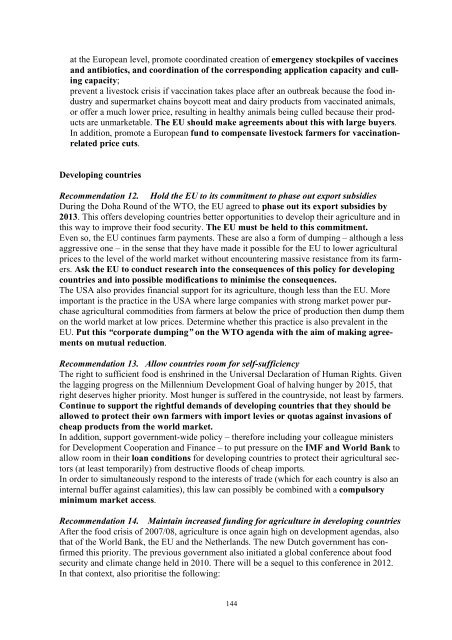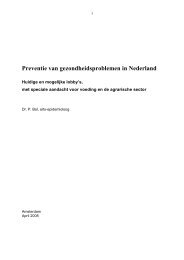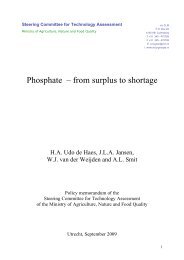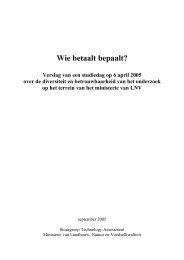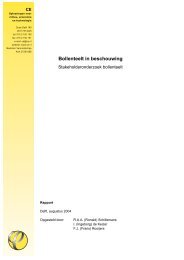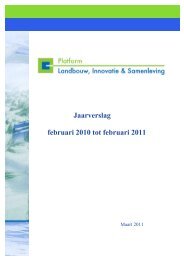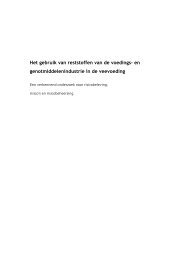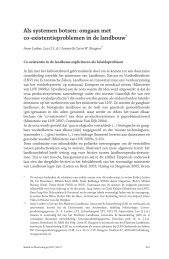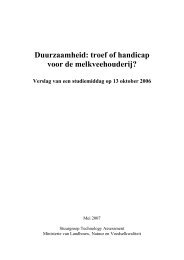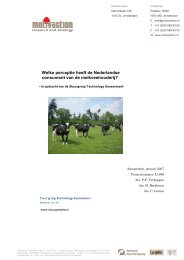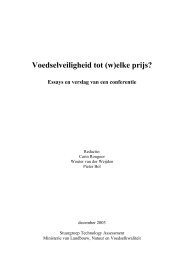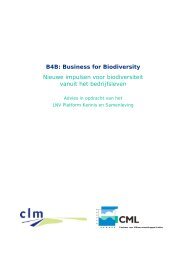De kwetsbaarheid van het Europese landbouw- en voedselsysteem ...
De kwetsbaarheid van het Europese landbouw- en voedselsysteem ...
De kwetsbaarheid van het Europese landbouw- en voedselsysteem ...
You also want an ePaper? Increase the reach of your titles
YUMPU automatically turns print PDFs into web optimized ePapers that Google loves.
• at the European level, promote coordinated creation of emerg<strong>en</strong>cy stockpiles of vaccines<br />
and antibiotics, and coordination of the corresponding application capacity and culling<br />
capacity;<br />
• prev<strong>en</strong>t a livestock crisis if vaccination takes place after an outbreak because the food industry<br />
and supermarket chains boycott meat and dairy products from vaccinated animals,<br />
or offer a much lower price, resulting in healthy animals being culled because their products<br />
are unmarketable. The EU should make agreem<strong>en</strong>ts about this with large buyers.<br />
In addition, promote a European fund to comp<strong>en</strong>sate livestock farmers for vaccinationrelated<br />
price cuts.<br />
<strong>De</strong>veloping countries<br />
Recomm<strong>en</strong>dation 12. Hold the EU to its commitm<strong>en</strong>t to phase out export subsidies<br />
During the Doha Round of the WTO, the EU agreed to phase out its export subsidies by<br />
2013. This offers developing countries better opportunities to develop their agriculture and in<br />
this way to improve their food security. The EU must be held to this commitm<strong>en</strong>t.<br />
Ev<strong>en</strong> so, the EU continues farm paym<strong>en</strong>ts. These are also a form of dumping – although a less<br />
aggressive one – in the s<strong>en</strong>se that they have made it possible for the EU to lower agricultural<br />
prices to the level of the world market without <strong>en</strong>countering massive resistance from its farmers.<br />
Ask the EU to conduct research into the consequ<strong>en</strong>ces of this policy for developing<br />
countries and into possible modifications to minimise the consequ<strong>en</strong>ces.<br />
The USA also provides financial support for its agriculture, though less than the EU. More<br />
important is the practice in the USA where large companies with strong market power purchase<br />
agricultural commodities from farmers at below the price of production th<strong>en</strong> dump them<br />
on the world market at low prices. <strong>De</strong>termine w<strong>het</strong>her this practice is also preval<strong>en</strong>t in the<br />
EU. Put this “corporate dumping” on the WTO ag<strong>en</strong>da with the aim of making agreem<strong>en</strong>ts<br />
on mutual reduction.<br />
Recomm<strong>en</strong>dation 13. Allow countries room for self-suffici<strong>en</strong>cy<br />
The right to suffici<strong>en</strong>t food is <strong>en</strong>shrined in the Universal <strong>De</strong>claration of Human Rights. Giv<strong>en</strong><br />
the lagging progress on the Mill<strong>en</strong>nium <strong>De</strong>velopm<strong>en</strong>t Goal of halving hunger by 2015, that<br />
right deserves higher priority. Most hunger is suffered in the countryside, not least by farmers.<br />
Continue to support the rightful demands of developing countries that they should be<br />
allowed to protect their own farmers with import levies or quotas against invasions of<br />
cheap products from the world market.<br />
In addition, support governm<strong>en</strong>t-wide policy – therefore including your colleague ministers<br />
for <strong>De</strong>velopm<strong>en</strong>t Cooperation and Finance – to put pressure on the IMF and World Bank to<br />
allow room in their loan conditions for developing countries to protect their agricultural sectors<br />
(at least temporarily) from destructive floods of cheap imports.<br />
In order to simultaneously respond to the interests of trade (which for each country is also an<br />
internal buffer against calamities), this law can possibly be combined with a compulsory<br />
minimum market access.<br />
Recomm<strong>en</strong>dation 14. Maintain increased funding for agriculture in developing countries<br />
After the food crisis of 2007/08, agriculture is once again high on developm<strong>en</strong>t ag<strong>en</strong>das, also<br />
that of the World Bank, the EU and the Netherlands. The new Dutch governm<strong>en</strong>t has confirmed<br />
this priority. The previous governm<strong>en</strong>t also initiated a global confer<strong>en</strong>ce about food<br />
security and climate change held in 2010. There will be a sequel to this confer<strong>en</strong>ce in 2012.<br />
In that context, also prioritise the following:<br />
144


